Toyota Sienna Service Manual: Identification of noise source
1. Radio Description
- Radio frequency band
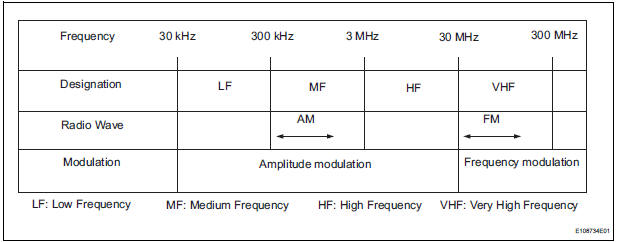
- Radio broadcasts use the radio frequency bands shown in the table below
- Service area
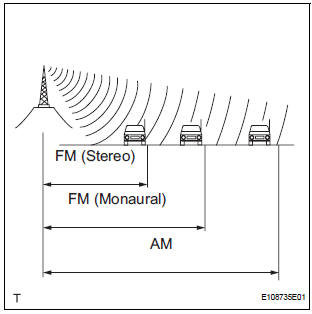
- The service areas of AM and FM broadcasts are vastly different. Sometimes an AM broadcast can be received very clearly but an FM stereo cannot. FM stereo has the smallest service area, and is prone to pick up static and other types of interference such as noise.
- Radio reception problems
HINT: In addition to static, other problems such as "phasing", "multipath", and "fade out" exist. These problems are not caused by electrical noise, but by the radio signal propagation method itself.
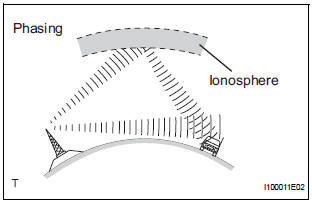
- Phasing
AM broadcasts are susceptible to electrical interference and another kind of interference called phasing. Occurring only at night, phasing is the interference created when a vehicle receives 2 radio wave signals from the same transmitter. One signal is reflected off the ionosphere and the other signal is received directly from the transmitter.
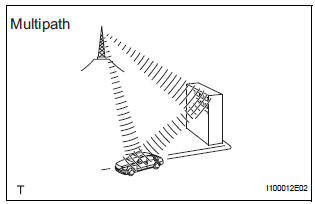
- Multipath
Multipath is a type of interference created when a vehicle receives 2 radio wave signals from the same transmitter. One signal is reflected off buildings or mountains and the other signal is received directly from the transmitter.
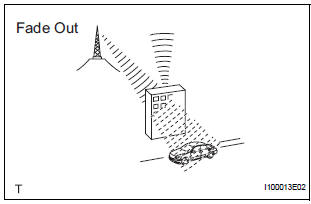
- Fade out
Fade out is caused by objects (buildings, mountains, and other large obstacles) that deflect away part of a signal, resulting in a weaker signal when the object is between the transmitter and vehicle. High frequency radio waves, such as FM broadcasts, are easily deflected by obstructions. Low frequency radio waves, such as AM broadcasts, are much more difficult to deflect.
- Noise problem
Technicians must have a clear understanding about each customer's noise complaint. Use the following table to diagnose noise problems.
|
Radio Frequency |
Noise Occurrence Condition |
Presumable Cause |
| AM | Noise occurs in a specified area | Foreign noise |
| AM | Noise occurs when listening to an intermittent broadcast | An identical program transmitted from multiple towers can cause noise where the signals overlap |
| AM | Noise occurs only at night | Music beat from a distant broadcast |
| FM | Noise occurs while driving in a specified area | Multipath or phasing noise resulting from a change in FM frequency |
HINT: If the noise does not match the examples above, refer to the descriptions about phasing and multipath.
 How to proceed with
troubleshooting
How to proceed with
troubleshooting
1 VEHICLE BROUGHT INTO A WORKSHOP
2 DIAGNOSTIC QUESTIONING AND SYMPTOM CONFIRMATION
Ask the customer about symptoms and confirm
malfunctions.
3 CONFIRM THE SYSTEM NORMAL CONDITION
4 CHECK D ...
 System normal condition check
System normal condition check
1. CHECK NORMAL CONDITION
If the symptom is applicable to any of the following,
it is intended behavior, and not a malfunction.
Symptom
Answer
A longer route ...
Other materials:
Terminals of ecm
Sfi system
Hint:
The standard normal voltage between each pair of the
ECM terminals is shown in the table below. The
appropriate conditions for checking each pair of the
terminals are also indicated.
The check results should be compared with the standard
normal voltage for that pair of te ...
Precaution
1. INSPECTION PROCEDURE FOR VEHICLE INVOLVED
IN ACCIDENT
Perform the zero point calibration and sensitivity
check if any of the following conditions occur.
The occupant classification ECU is replaced.
Accessories (seatback tray and seat cover, etc.)
are installed.
...
Registering and connecting from the ÔÇťBluetooth* SetupÔÇŁ screen
To display the screen shown below, press the ÔÇťSETUPÔÇŁ button and
select ÔÇťBluetooth*ÔÇŁ on the ÔÇťSetupÔÇŁ screen.
Select to connect the device to
be used with audio system.
Select to register a Bluetooth® device to be used with audio system.
Select to set detailed
Blueto ...
